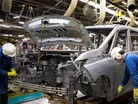Nissan Expands Green Steel to cut Scope 3 Emissions

Nissan's recent decision to significantly expand its use of green steel in Japan represents a significant advancement in reducing Scope 3 emissions — indirect emissions across its entire value chain.
Since steel accounts for roughly 60% of a vehicle's weight, the shift is expected to impact the automotive industry's carbon footprint substantially.
The company aims to increase its use of low-CO2-emission steel fivefold in its Japanese operations by fiscal year 2025 compared to 2023.
The move aligns with Nissan's broader sustainability strategy under the Nissan Ambition 2030 plan, which targets a 30% reduction in CO2 emissions across the vehicle lifecycle by 2030 and aims for full carbon neutrality by 2050.
Green steel: A transformation for automotive decarbonisation
Traditional steel manufacturing relies heavily on coal-powered blast furnaces, a leading source of industrial greenhouse gas emissions. Nissan's adoption of green steel — produced using hydrogen or renewable electricity — offers a more sustainable alternative without compromising vehicle quality or performance.
Nissan's collaboration with key steel manufacturers, including Nippon Steel Corporation, JFE Steel Corporation and POSCO, is pivotal in accelerating the transition to green steel. These partnerships enable the mass production of low-carbon steel, helping the entire automotive sector make meaningful progress toward reducing its emissions.
The mass-balance approach in green steel production ensures sustainability is embedded throughout the supply chain. The system allows for CO2 emission reductions to be allocated across different products based on the total emissions of the production process, creating a more environmentally responsible manufacturing framework.
Holistic sustainability commitments beyond steel
Nissan's sustainability efforts extend far beyond steel. The Nissan Green Program 2030 (NGP2030) outlines ambitious targets for reducing CO2 emissions and increasing the use of sustainable materials across various markets, including Japan, the US, Europe and China. Key targets include:
- A 30% reduction in per-vehicle lifecycle CO2 emissions
- A 52% reduction in per-vehicle manufacturing CO2 emissions
- A 50% reduction in per-vehicle driving CO2 emissions for new models in four major markets
- Increasing the ratio of sustainable materials used in production to 40%
Joji Tagawa, Nissan's Chief Sustainability Officer, highlights the initiative's importance: "Each generation of the programme has been driven by the most critical themes of the time, has driven business transformation and has achieved tangible impact. It makes us a more competitive company."
Future-proofing automotive manufacturing
Beyond steel, Nissan is making significant strides in reducing emissions from other materials. By 2030, the company plans to transition to low-CO2-emission aluminium and incorporate green or recycled aluminium in all new models starting in fiscal year 2027.
The initiative expects to cut CO2 emissions during aluminium production by 50% for green aluminium and up to 95% for recycled aluminium.
Makoto Uchida, CEO of Nissan, highlights the company's forward-looking approach: "We have launched this new vision because the time is right for Nissan to change gears from focusing on business transformation to realising a better future for society.
"We are taking this opportunity to clearly articulate how our innovations create unique value by empowering journeys through more confident, exciting and integrated experiences and empower society by creating a smart ecosystem with integrated mobility."
Aligning profit with progress
Nissan's commitment to green steel and other sustainable materials is not just about reducing environmental impact — it strengthens its resilience against potential carbon taxes and evolving regulatory frameworks. By integrating sustainability into its core manufacturing processes, Nissan is positioning itself as a leader in low-carbon automotive production, ensuring long-term profitability while driving meaningful progress toward a cleaner, more sustainable industry.
Through these efforts, Nissan is meeting growing consumer and regulatory demands for greener vehicles and setting a new standard for sustainability in automotive manufacturing. As the industry continues to evolve, initiatives like these will be crucial in shaping the future of mobility and ensuring a more sustainable planet for future generations.
Make sure you check out the latest industry news and insights at Scope 3 Magazine and be part of the conversation at our global conference series, Sustainability LIVE and Procurement & Supply Chain LIVE.
Discover all our upcoming events and secure your tickets today. Subscribe to the Scope 3 Magazine newsletter.
Scope 3 Magazine is a BizClik brand.
- The Evolving Role of Chief Sustainability OfficersScope 1 2 and 3
- Scope 3: Baltic States end Russian Energy DependenceSustainable Procurement
- Evri & Protega Tackle Scope 3 via Sustainable PackagingTransportation & Logistics
- Overstretched Experts & Competition Hinder SustainabilityScope 1 2 and 3

